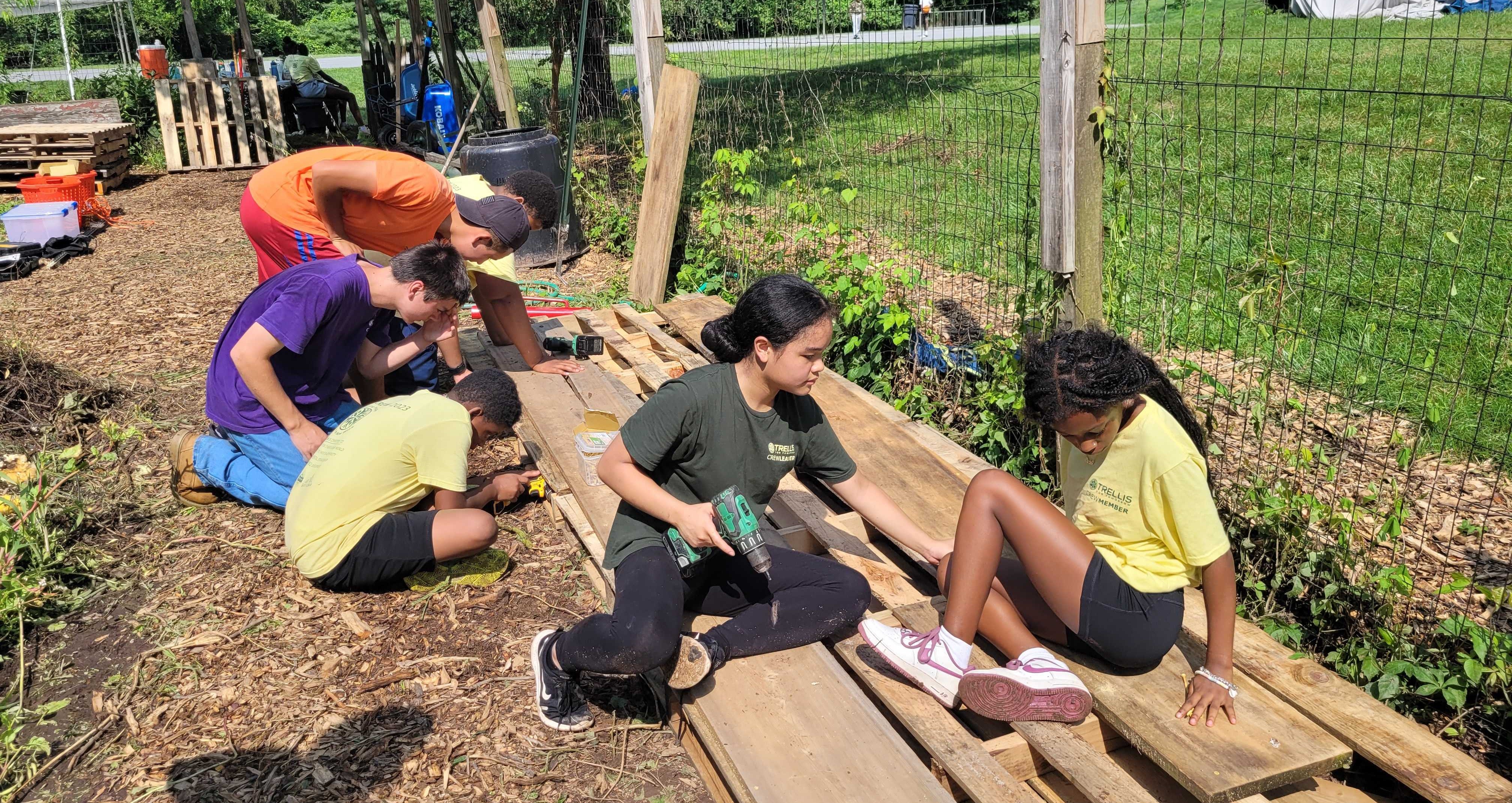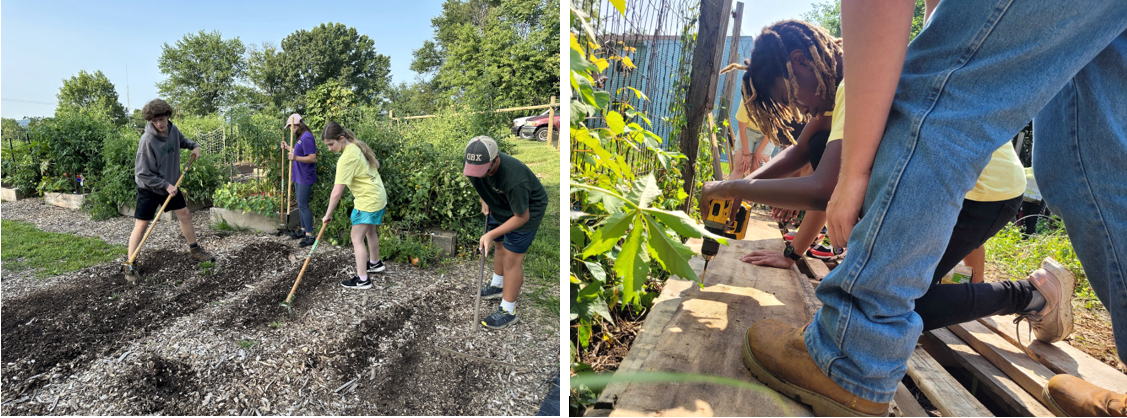Grace Hardy, Jennifer Anderson & Mindy Aldridge
Listen4Good (L4G) recently invited Trellis for Tomorrow and The Nelson Foundation, an L4G participant and funder, respectively, to share their journey engaging in feedback programming and building their own muscles for community listening and engagement.
L4G is an 18-month capacity building program that helps nonprofits survey their clients to improve outcomes and impact. L4G was founded in 2016 by Fund for Shared Insight, and has supported over 850 nonprofits across the country through their feedback program.
The following two interviews have been condensed and edited for clarity.
Nonprofit Perspective: Trellis for Tomorrow
First, Listen4Good spoke with Grace Hardy, Program Operations Manager, and Jennifer Anderson, the Executive Director of Trellis for Tomorrow about their feedback program experience.
One nonprofit’s experience with feedback: Trellis for Tomorrow
Based in Greater Philadelphia, Trellis for Tomorrow is a non-profit whose mission is to deliver experiential programs in organic gardening, environmental education and food security to provide practical and behavioral life skills for youth and adults.
Trellis has always been interested in obtaining authentic, honest feedback from participants. They’ve normally collected feedback through surveys, but their past survey methodology was not particularly streamlined, and tended to include too many questions.
What Trellis learned from youth and families
Through Trellis’s funder, The Nelson Foundation, they learned of an opportunity to participate in a program that focused on improving their feedback process. They were thrilled to be able to create surveys with help from L4G for whom this was their core expertise.
They decided to focus on their SEED Skills program for young people ages 12-18 since feedback for that age group can be more difficult to capture. Trellis was interested in obtaining general feedback about the program, as well as hearing from parents about their perception of the SEED Skills program and their experience with the registration process.
Feedback from participants was mostly positive, but when Trellis asked an open-ended question about what would make the program better, youth responded by asking for three types of changes:
- greater variety or more engaging activities;
- more focus on work readiness skills; and
- improvements to the lunch offerings.
Among parents, 92% felt that the program met their child’s needs very well, but only 75% were satisfied with the registration process, highlighting another area for improvement.
Responding to what they heard
Based on the feedback they received, Trellis changed a few things with the registration process and program delivery.
- During orientation, they hosted several in-person sessions during the registration process. Parents could meet program delivery staff ahead of time and complete paperwork in person. Previously, Trellis had completed this work via email and phone calls.
- During program delivery, Trellis focused more on hands-on activities rather than discussion-based activities and included more cooking demonstrations with a focus on skill building in the kitchen.
- To close the loop with participants and parents, Trellis created a graphic that visually represented the feedback they received from participants and parents. Following the program, they sent the visual to all families that participated.
How Trellis changed and strengthened its feedback system
After completing one cycle of a more rigorous feedback methodology, Trellis learned to create better surveys and interpret the data in more meaningful ways. They also tapped the expertise of their assigned Listen4Good feedback coach, who enhanced and reinforced their learning. Here are some of the highlights of those new feedback muscles:
- Stronger survey development. The team was able to consolidate their surveys, and identify which questions were truly most important. They also learned to create questions that were more effectively worded, so that respondents interpreted the questions as intended.
- Improved skills in data interpretation & analysis. Once the data was received, the team was able to focus its efforts and pull meaningful takeaways from a large amount of input.
- New data segmentation skills. Listen4Good’s resources helped the team filter responses so they could identify trends by sites and demographics. This filtering of data helped them understand if kids of different ages or backgrounds or attending various sites had different experiences of the program.
Trellis’s learning culture and focus on transparency
This new process has underscored the importance of follow-up and sharing data with stakeholders.
Going forward, Trellis is focused on using data to inform their programming. They also now share the feedback they’ve collected with their stakeholders, so that their stakeholders see how their input informs programming and how their voice can help the organization to improve.
Funder Perspective: The Nelson Foundation
The Nelson Foundation sponsored Trellis for Tomorrow’s participation in the Listen4Good program. Mindy Aldridge, President of The Nelson Foundation, shared more about the Foundation’s mission and rationale for supporting Trellis in its feedback work.
A funder’s commitment to equity: The Nelson Foundation
The Grace S. and W. Linton Nelson Foundation is a private independent foundation that acts to eliminate systemic racial and social inequities by investing for impact with partner organizations in the Greater Philadelphia region that are committed to serving young people, their families and the communities in which they live.
How feedback supports the Foundation’s vision and strategy
We’ve always been focused on helping our grantee partners identify outcomes they can measure and incorporate input from the communities they are serving. Community voice became more important than ever once we shifted our vision and mission to center racial equity and social justice.
The community served must be at the center of the work. This is seen in our grant application when we ask, “How does your organization gather, learn from, and incorporate feedback into programming? And, how do you ensure you understand and are addressing the needs of the community you intend to serve?”
We believe our grantee partners need to focus on gathering information and feedback from the communities they serve so that they provide the services that are most needed and in the most meaningful way possible. We are all operating in silos unless we are including the voices of community members.
Listening and feedback reinforces Nelson's values, especially around accountability, partnership, and humility.
One value, accountability, holds us to our mission which emphasizes an unwavering commitment to young people by supporting our grantee partners to center lived experience as a key part of that obligation. We’re also holding ourselves accountable to getting feedback. One of the ways we do this is by having a community member on our board.
We also value partnership. We’re working to build relationships with our grantee partners and go beyond the grant dollar to support their efforts to mirror the same with their clients.
Why the foundation supports grantees in feedback work and capacity building
We know that giving grant money isn’t enough. Our general operating grants are critical to the ongoing operations and programming of our grantee partners. But we also want to invest in professional development, program and organizational improvement, and
So, we feel a responsibility to provide other types of support, and that includes capacity building. We believe capacity building, including program evaluation, is critical. It is about meeting the needs of communities and participants, improving programming, strengthening organizations, and providing professional development and skills at an individual level.
Advice to funders considering feedback & other professional development and capacity building support to grantees
Just do it. Just like Nike says.
General operating support is not capacity building.
A grantee might use some general operating funds for capacity building, but that is often a luxury. If we want our grantee partners to improve their programs and better meet the needs of their clients, they need to invest more capacity.
It’s a no-brainer that funders should be providing capacity-building support in addition to general operating support and program support.
How feedback advances the mission of The Nelson Foundation
Supporting investment in strong feedback programs directly supports our mission as it:
- Ensures that our grantee partners are providing the most valuable programming for the communities they serve. Our success is reflected through our grantee partners’ ability to meet their
audiences’ needs. - Strengthens the partnership we have with our grantees. By investing in our grantee partners in ways beyond our grantmaking, we are deepening our relationship and partnership.
- Creates a new avenue for our Foundation to understand the communities that are served by our grantees, which is
helpful to our work.
It’s so critically important to gather information from the communities we serve. If you can incorporate that feedback into your work, you complete the circle.
To learn more about how Listen4Good supports foundations and nonprofits, explore Listen4Good’s free resources, including our Listen4Good Insights blog, publications, and informational webinars.


